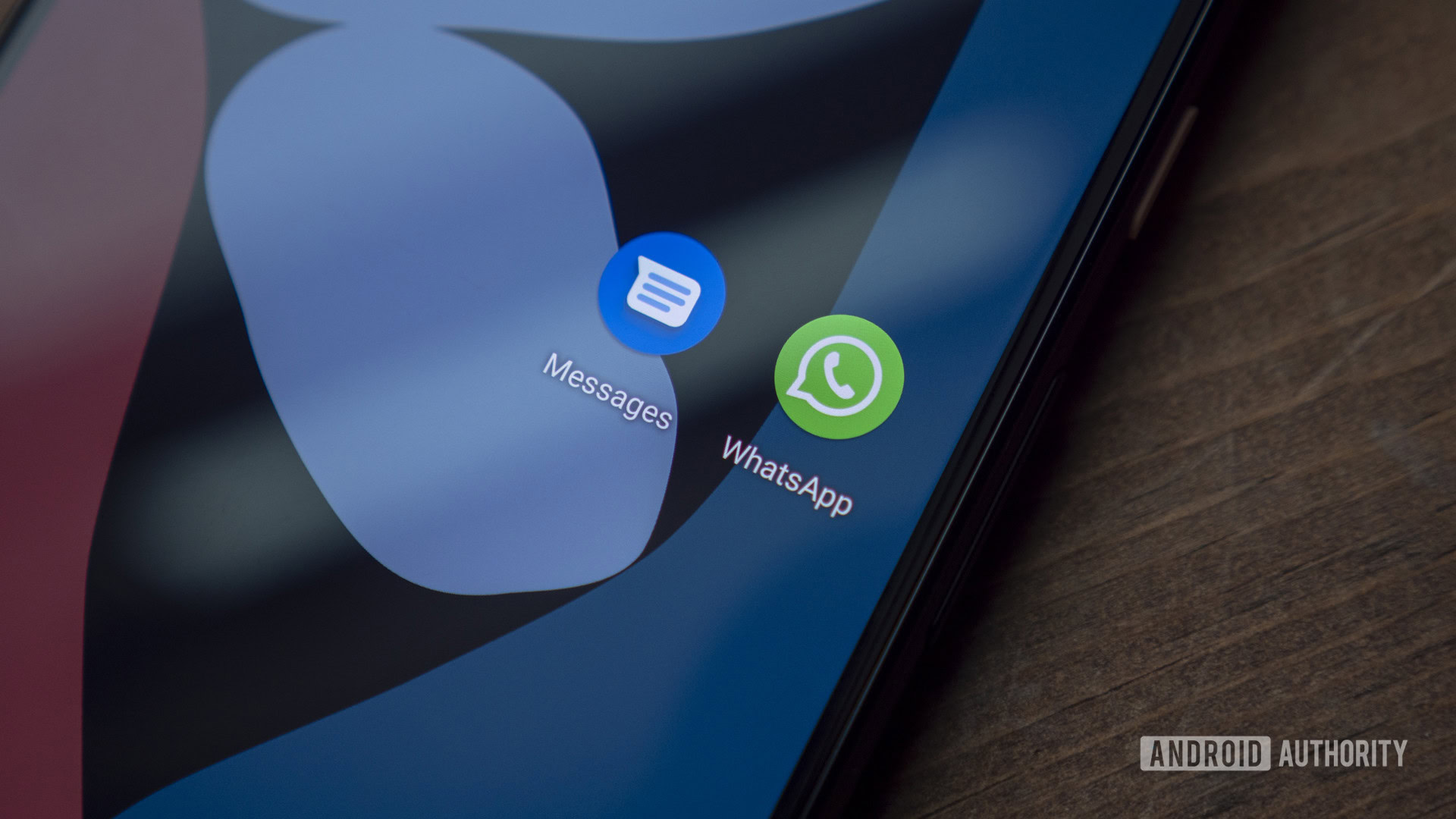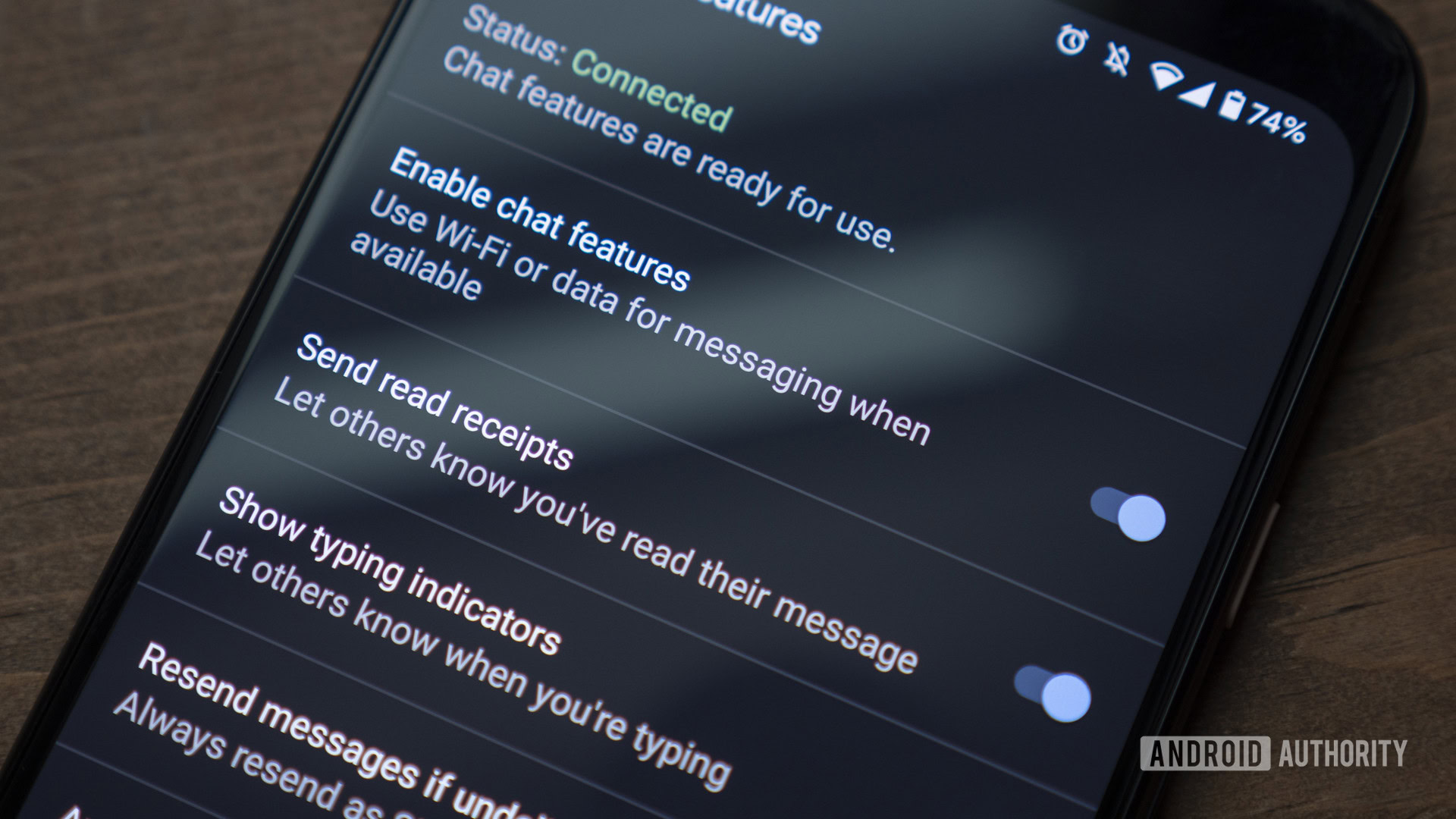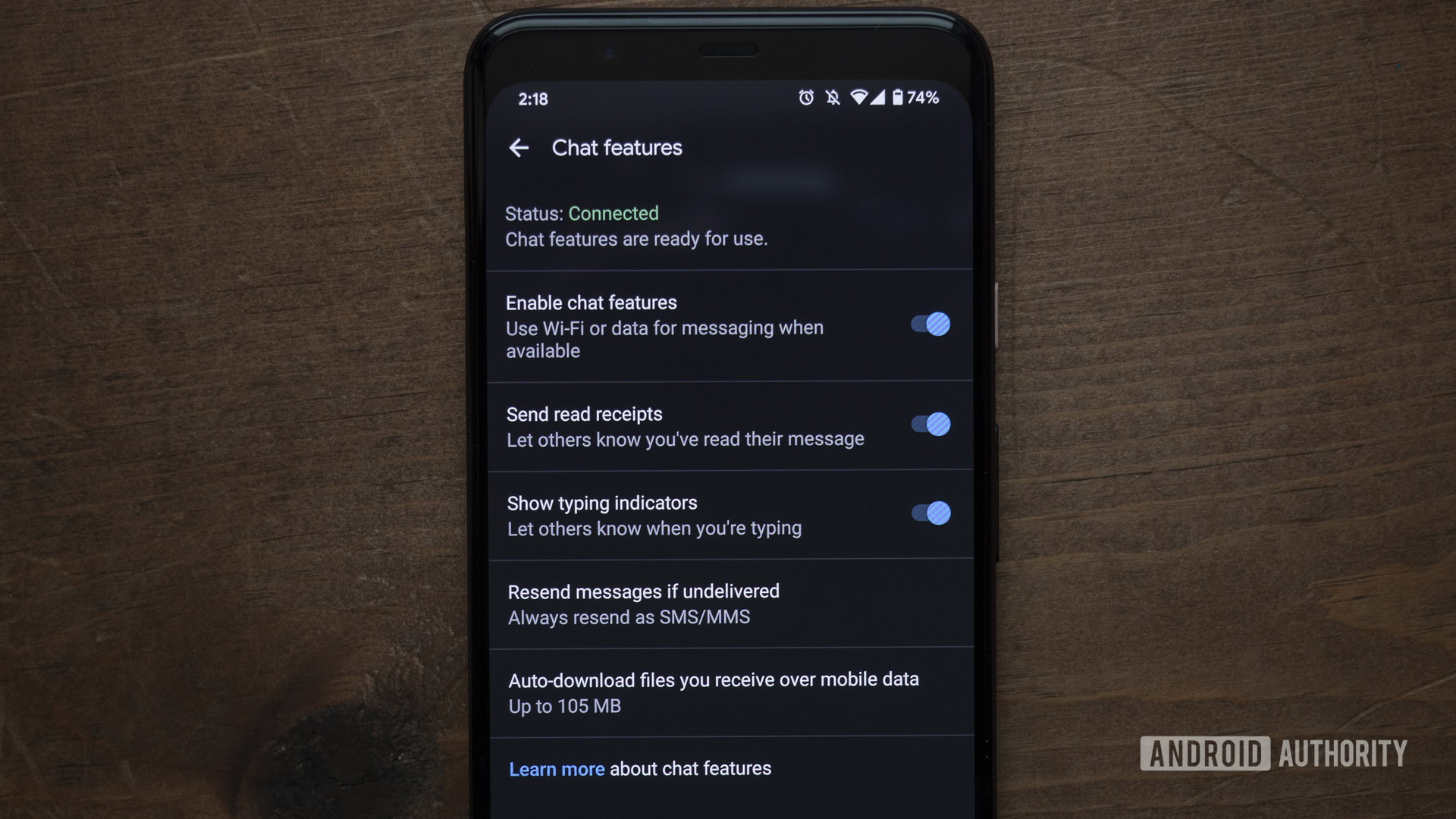Affiliate links on Android Authority may earn us a commission. Learn more.
RCS vs WhatsApp: Thoughts from a long-time WhatsApp user
Published onNovember 6, 2019

Messaging on Android devices is a bit wonky right now. Okay, it’s very wonky. Out of the box, Android users have their default SMS/MMS app (usually Google’s Messages app), and possibly another pre-installed messaging app from their carrier or phone manufacturer. Top that off with the numerous internet-based messaging services we all use with various friends and family members, and things can get a little overboard.
Personally, I use three messaging apps to talk to various people in my life: Google’s Messages app to talk with my family who all use SMS; WhatsApp to talk with my wife and industry colleagues; and Facebook Messenger to group chat with my friends. I don’t like using so many messaging apps, so I was excited to hear about the Rich Communications Services (RCS) hack that made the rounds last week. If I could get my wife moved over to Google’s Messages app with RCS, I could spend most of my time chatting in Google’s preferred messaging app.
Not that I have anything against WhatsApp, but I was simply eager to jump onboard with the new messaging standard that promises to make a more seamless experience across all Android phones. But after using RCS for a week or so (and moving my wife off WhatsApp for this experiment), I’m not so convinced jumping the WhatsApp ship was the right idea.
Don’t miss: The best messenger apps and chat apps for Android
RCS vs WhatsApp: Different beasts

For starters, RCS and WhatsApp are completely different messaging experiences, so this can’t really be a 1:1 comparison. WhatsApp is a Facebook-owned messaging service that requires an internet connection to work. Users need to manually download the app and sign up for an account before using the service. Once you and your friend or family member both have a WhatsApp account, you can chat on the service pretty seamlessly. As long as you have the app installed and have access to the internet, WhatsApp will work.
RCS, on the other hand, is an advanced messaging protocol that, in theory, will work with all Android phones out of the box as long as carriers add support for it. RCS will eventually be baked into existing messaging apps like Google’s Messages, meaning users don’t have to download a third-party app to use it. The problem is, all carriers don’t support it yet, and even the ones that do don’t support it on every phone model. For instance, the Pixel 3 on Google Fi has supported RCS since January 2019, but the Pixel 4 on Google Fi didn’t have RCS support until earlier today. In fact, without last week’s RCS messaging hack, I couldn’t use RCS on my T-Mobile Pixel 4 XL at all, even though other phones on the network are supported.
Even if you and your friend have RCS enabled and working, it’ll still provide a much different experience overall compared to WhatsApp.
A big difference between the two is levels of encryption. RCS messages are encrypted in transit, but they’re not end-to-end encrypted. That means Google or your carrier can read your messages, though the messages are encrypted as they travel through the internet. By contrast, all WhatsApp messages are end-to-end encrypted, meaning you and your WhatsApp buddy are the only parties who can read those messages.
WhatsApp also provides an additional level of security in the form of fingerprint lock. RCS is a messaging protocol, not a service, so this isn’t really a feature it can ever support. Google’s Messages app does not support fingerprint lock, though there are a few third-party apps that add this feature to any app.
WhatsApp is also tipped to get disappearing messages in the future, as well as the ability to block frequently forwarded messages in groups. Earlier today, it also received new group chat privacy settings.
I think it’s pretty clear: WhatsApp is by far the most secure option out of the two.
RCS does have some bright spots, though. Okay, it has two that I can think of. By nature, RCS features are added to existing SMS/MMS applications to provide advanced messaging features when an internet connection is available. If internet isn’t available, your app will still be able to fall back on the legacy SMS framework. In contrast, WhatsApp is entirely reliant on an internet connection. No internet? No WhatsApp.
RCS also has the promise of eventually being available on every Android handset in the future. So, in a perfect world, you won’t need to get your friends or family to sign up for a new service just so you can both use advanced messaging features.
Read more: Big four US carriers unite to deliver RCS messaging
RCS vs WhatsApp: Any similarities?
Why even make this RCS vs WhatsApp comparison at all if there are so many differences? There just so happens to be a handful of similarities between the two.
- Large file sharing: Both support large file sharing up to 100MB.
- Group chats: Both RCS and WhatsApp support group chatting.
- Read receipts and typing indicators: RCS and WhatsApp will both let the recipient know when messages have been read and when the other person is typing.
- Chat backups: Okay, this one is a little different since RCS as a protocol doesn’t natively support chat backups. Instead, you’ll need to rely on the standard Android system backup to save and later restore all your RCS messages. WhatsApp has support for local and Google Drive backups, which can be accessed once you log into your WhatsApp account on any device.
- Browser support: This isn’t necessarily RCS-related, but Google’s Messages app and WhatsApp both have web interfaces if you want to message from your browser.
RCS will be great as a default, but maybe not as a WhatsApp replacement

WhatsApp and RCS share similar features, but they don’t nearly provide the same messaging experiences. WhatsApp has been around for so long that it’s been able to roll out quite a few little features that make for a really nice messaging experience overall. Message forwarding, rich text support, message quoting, and more are all supported in WhatsApp, and you can find even more tips and tricks for the app right here.
RCS as a messaging protocol is an obvious upgrade over traditional SMS/MMS chatting, but it’s held back by a few things. It’s a relatively new standard that’s taking a very long time to roll out. Also, while the core features of RCS will be supported across all compatible messaging apps, your mileage will vary depending on which app you’re using. For instance, Google’s Messages app offers different features to Samsung’s stock messaging app, despite both supporting the RCS standard.
And here’s the big one: RCS is only going to work with other Android phones, meaning RCS won’t work with your iPhone-owning friends unless Apple supports it down the line. That’s going to be a pretty big downside for people, especially considering Apple holds nearly 40% market share in the US.
If you’re already a diehard WhatsApp user, there are few reasons for you to switch back to an RCS-enabled messaging app. I probably won’t stay on the Google Messages/RCS train for long — I just feel much more secure using an end-to-end encrypted service, and these RCS compatibility issues are getting old fast.
The eventual goal with RCS is to make messaging better for everyone on Android. I absolutely think that will be the case as soon as carriers stop dragging their feet and roll it out to everyone. Until then, though, you’re better off sticking with the messaging app you’re already using.
Now I want to hear from you in the RCS vs WhatsApp debate. Do you use WhatsApp, RCS through an SMS app, or something else entirely?